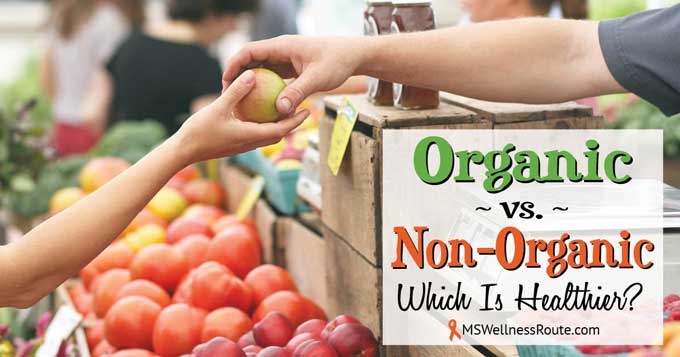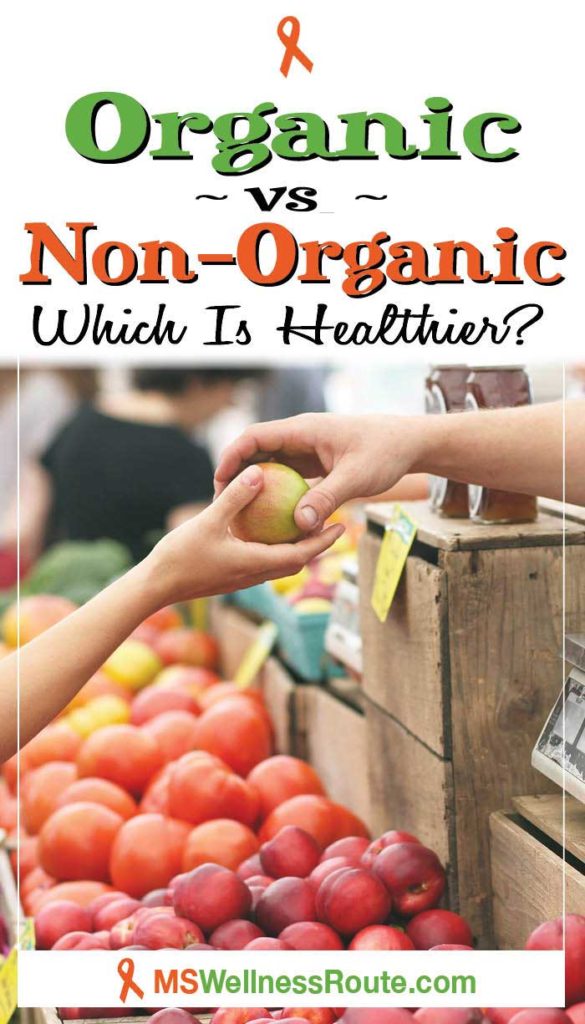Last Updated on November 30, 2023 by Cathy

Eating organic has become very popular in the past several years. It’s no wonder with the rise in toxins hiding in our food including pesticides and antibiotics. While the rise in autoimmune diseases has also gone up.
Once a person from a low-risk area for an autoimmune disease moves to a Western country, their risk also rises. There are 80 different autoimmune diseases attacking 75-80 percent of mostly women.
The National Institutes of Health estimates that 23.5 million in the U.S. have an autoimmune disease. However, the American Autoimmune Related Diseases Association estimates there are 50 million affected.
A few years ago the estimate for multiple sclerosis (MS) was 400,000 people in the U.S. It’s now estimated there are nearly one million people. That is a huge jump!
What is going on?
Researchers believe people are at risk for an autoimmune disease through their genetics. They also believe it’s the environment triggering it. When you think about it we live in a very polluted world including our food, water, air, and soil.
Boise, Idaho is 588 miles (946 kilometers) from the ocean. Yet, when Japan had the earthquake and tsunami in 2011 the nuclear fallout moved west falling in Boise.
Boise ended up with the greatest amount of radiation fallout. The level was 80 times higher than the U.S. drinking water standards.
Officials played it down saying it was safe but they were very concerned about milk from cows. The cows were getting contaminated due to radiation falling on the pastures. Then the consumer, YOU, were drinking it.
Things that end up in conventional foods are:
Antibiotics
Artificial ingredients
Fertilizers
Genetically modified organisms (GMO)
Growth hormones
Herbicides
Pesticides
Preservatives
Refined sugar
Is Organic Healthier Than Non-organic?
How your food is grown or raised plays a role in your health. If you are eating conventional and processed foods it’s destroying your gut bacteria. Researchers discovered people with certain autoimmune diseases have more bad bacteria in their gut.
Organic foods have more antioxidants and nutrients. Plus they are fresher and taste better. Organically raised animals get space to roam around which keeps them healthier. Labels on chicken meat often say it was vegetation-raised. Chickens are NOT vegetarians, they eat bugs!

Is there really a difference between organic and non-organic?
Non-organic produce has pesticides sprayed on them to keep bugs away. Unfortunately, most of us have a build-up of pesticide exposure in our bodies. Studies show this leads to diseases including cancer and autoimmune diseases. Plus, you can’t always wash the produce to remove pesticides.
Some produce is GMOs which are throughout the production. The herbicide Roundup (glyphosate) has risen 15 times higher since its introduction in 1974. Glyphosate is a carcinogen which is a substance that causes cancer. It also disrupts the endocrine system, and gut bacteria, and increases food allergens.
Pesticides affect our nervous system and our brain. Pesticides raise the risk of diseases like lupus, MS, and Parkinson’s disease. It’s best to eat a wide range of food, wash produce before eating, and buy organic when possible.
Buy Organic When Possible
People are eating healthier today plus organic produce tastes better. To stop the progression of autoimmune diseases you need to heal your gut. Eating foods that promote good health and improve your gut bacteria is very important.
Avoid conventionally raised animals that were fed GMO corn and soy. Plus you’ll be avoiding antibiotics and hormones. These animals are sick, overweight, and unhealthy, you don’t want to eat them. Instead, eat animals that are raised healthy and aren’t stressed.
Meats to eat:
- Grass-fed and finished meats
- Pasture-raised poultry
- Wild-caught fish
Keeping the cost down on organic foods
It is healthier to eat organic but it is also more expensive than non-organic foods. When money is tight it isn’t always possible to buy organic. But there are things you can do to save money and still eat healthily.

Ways to keep the cost of organic foods down:
- Buy produce when in season
- Co-op
- Community-supported agriculture (CSA)
- Discount stores like Costco
- Farmers market
- Plant a garden
- The Dirty Dozen and Clean 15
- Visit a local farm
The Environmental Working Group releases findings on produce with the most pesticides. They call it their “Dirty Dozen.” The produce with the fewest pesticides is safe to buy non-organic which will help you save money.
The 12 fruits and vegetables with the highest pesticides:
- Strawberries
- Spinach
- Kale
- Nectarines
- Apples
- Grapes
- Peaches
- Cherries
- Pears
- Tomatoes
- Celery
- Potatoes
Strawberries are again on top of the list for the most pesticide residue. Almost 99 percent of the samples had at least one pesticide. One sample had 81 different pesticides in various combinations.
“Strawberry growers use jaw-dropping volumes of poisonous gases to sterilize their fields before planting, killing every pest, weed and other living thing in the soil.”
– Environmental Working Group
New to the list this year is kale, nearly 60 percent of the samples had pesticides. Including the pesticide Dacthal, which is considered a possible carcinogen. The European Union banned Dacthal but it is still allowed in the U.S.
Produce With The Fewest Pesticides
They also have a list called the “Clean 15.” You guessed it – it’s a list of produce with the smallest amounts of pesticides. If you are watching your money these are the fruits and vegetables you can safely buy from the non-organic section.
You should always wash your fruits and vegetables when you bring them home. I saw someone dropping a sweet potato on the floor of the grocery store. Then they placed it back on the shelf for someone else to buy – yuck!
15 fruits and vegetables with the fewest pesticides:
- Avocado
- Sweet corn
- Pineapples
- Sweet peas (frozen)
- Onions
- Papayas
- Eggplants
- Asparagus
- Kiwis
- Cabbages
- Cauliflower
- Cantaloupe
- Broccoli
- Mushrooms
- Honeydew melons
Be Smart
It’s hard to avoid all the toxins in our food. But the more you avoid foods that cause inflammation the better off you’ll feel. Eat organic when possible, eat lots of vegetables, and eat foods that promote a healthy gut.
Get Access to my Free Library
Get the password for my library with MANY wellness printables here by filling out this form:
Want to remember this post? Pin it to your favorite Pinterest board!
Resources:
https://www.ncbi.nlm.nih.gov/pubmed/21601587
https://people.csail.mit.edu/seneff/2018/Roundup_and_Neurodegenerative_Disorders_RosemaryMason.pdf







